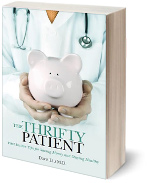Is Dr. Daniela Drake Correct? Your Doctor May Feel But is NOT a ‘Beaten Dog’
Dr. Daniela Drake writes an provocative and bold piece on the plight of doctors in America and the impact it has on patient care in her The Daily Beast article Why Your Doctor Feels Like a ‘Beaten Dog’. Many doctors do feel disenfranchised. Others would not want their children to become doctors. Though health care is very bureaucratic with administrative paperwork, obstacles, and hassles, her linkage of how patients were neglected as a consequence of the system we work in is weak.
She talks about Victoria, a teenager, who shortly after a necessary surgery which required mesh placement, developed painful rashes that no one could help with until she found a specialist a decade later who had seen a similar issue. Mesh removed. Painful rashes gone.
Is this a fault of our health care system?
No.
Not getting the right diagnosis isn’t necessarily a problem of the health care system.
The problem is how do we specifically take the wisdom of the crowds, i.e. group intelligence of all doctors, and provide it in a quick and easy way right to the point of care? Currently patients rely on a doctor’s individual experience to correctly and accurately diagnose and provide treatment. This depends entirely on her training, interest, and exposure to varies problems and maladies which may or may not be relevant to the patient problem in front of them.
In the case of Victoria, the issue wasn’t necessarily that the doctors she saw didn’t listen. The issue was she hadn’t yet encountered a doctor who had seen a similar problem and could identify it. Doctors she had seen in the past tried to fit her problem into a list of diagnoses they knew about. We don’t know what we don’t know. That is the real issue at hand.
In the books How Doctors Think and Management Lessons from Mayo Clinic: Inside One of the World’s Most Admired Service Organizations
illustrated similar issues. In the former, a woman for years has had abdominal pain and sought a variety of doctors to no avail. What is the point of seeing one more doctor? Yet despite her reluctance and at considerable urging by her family, she sees him after a last minute cancellation around the holidays. He has her stack of medical records on his desk. He takes a piece of paper and asks her to talk about her problem. She is incredulous. Didn’t he review all of her medical records? Didn’t he see all of the tests he had done? What was the point of talking?
He diagnoses her with celiac disease. She is about to cry. That ultimately was the correct diagnosis. Like Victoria, it was finding a person not only who could listen. Yes our health care system does not reward listening or cognitive expertise. But providing more time alone, does not mean better outcomes. The real issue is finding someone who could link her symptoms and problems to something he had seen personally or knew about.
At the Mayo Clinic a similar problem occurs – the gap between what the group knows and the individual is immense.
A young Mayo Clinic patient died unnecessarily. “It was a preventable death,” Dr. Swensen says, “The death happened because ‘Mayo didn’t know what Mayo knows.'”
It turns out that at Mayo Clinic they have the premier expert on long QT interval, Dr. Michael Ackerman. Although the patient EKG did showed a rare “long QT interval”, the treating doctor was unable to link this finding or the expertise of Ackerman to this patient. As a consequence of this outcomes and generosity of the family, Mayo embarked on an “electronic means of moving Dr. Ackerman’s knowledge to any Mayo Clinic physician at the moment he or she needs it, whether or not the doctor knows the information is needed.” Specifically, when an EKG is identified as having a long QT interval which is confirmed by a cardiologist, an automated electronic message is sent to the ordering doctor for confirmation that he sees the result. In addition, the message also contains a link which “provides a directory of Mayo Clinic experts on the disease on condition, and then offers answers to frequently asked questions, key facts, and clinical guidelines.”
In essence:
The electronic systems provide specialized knowledge to the managing physicians so that they can know what they don;t know about safe care for their patient. This innovation in the science of healthcare delivery helps ensure that patients always get the best care regardless of whom they see or where they are seen in the system.
Will Having More Time with Doctors Help?
Certainly having more time with patients will help. It will also require teamwork and having systems that support the doctor providing the care. Entrepreneurs developing technology will help solve this problem.
Though direct pay or concierge medicine for primary care can remove some issues of administrative hassles and burdens, it is unclear that in that situation which often individual doctors working in small groups that this issue if “not knowing what we do not know” will be overcome.
This “not knowing what we do not know” problem also illustrates the importance of patients to play an active role in their care. There have been many examples of patients who have helped themselves and their doctors by becoming experts on their specific diseases. When the doctor-patient relationship and partnership is excellent, both parties benefit greatly. Again, it is about teamwork.
Wouldn’t it be great if you had an easy way to get these answers?
You might like
Will Doctors and Patients Pick a Better Healthcare System If They Saw It?
The Brutal Reality of Primary Care – Family Medicine
Is Making Primary Care More Professionally Satisfying As Simple As Lowering Panel Size?
Required Reading for Medical Students, Interns, and Residents
 Get important exclusive advice and tips on how to save money while staying healthy.
Get important exclusive advice and tips on how to save money while staying healthy. Learn how to make intelligent choices in America's Healthcare System.
Learn how to make intelligent choices in America's Healthcare System.
Hi,
Your article is fabulous!
Thanks for the hat tip!
-dd